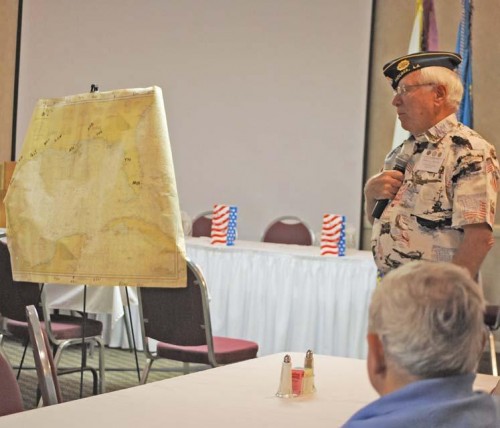
Andrew Galliano Sr.
October 19, 2010
Local historian revisits WWII submarine warfare
October 21, 2010The Lafourche Parish Council will keep a watchful eye over the Solid Waste Fund during the next year, as they consider the possibility of adding a one-tenth of a penny sales tax to bolster the fund and continue the program.
As of Sept. 30, the fund balance was $1.4 million, and projections for the 2011 budget have the fund dwindling to $72 for the beginning of 2012 because the expenses are expected to overwhelm revenue.
Solid waste is funded by a seven-tenths of a cent sales tax, down from the full penny the parish citizens approved in 1986. The council decreased the amount taxed in 1996 when the fund had a $17 million surplus.
The council has the power to restore the tax to a full penny with a majority vote but is more likely to add only one-tenth of a cent to the tax if the fund continues to lose money.
The Solid Waste Fund pays for parish garbage pickup.
“Eventually something will have to be done,” councilman Mike Delatte said. “We still have a few dollars to play with, but it’s time to start paying attention. People are satisfied with the service and we need to keep it in the black.”
In 2005, the surplus had dwindled to approximately $350,000, and the council was preparing to vote on raising the tax, but the parish received a spike in revenue in the fallout of hurricanes Katrina and Rita.
Council Chairman Daniel Lorraine said the lifting of the offshore drilling moratorium and revenue stemming from BP settlements could bolster the economy and help the fund, similar to what happened in 2005.
Since May, the first month after the April 20 Deepwater Horizon explosion, comprehensive sales tax collection is up $434,287, or 8.7 percent, over the same time in 2009.
Sales tax revenue for September 2010 increased $211,735 from September 2009, a 15.3 percent increase.
While the moratorium cost many people their jobs and seemed likely to stifle the economy, it has been offset thus far by money fishermen earned with the BP Vessels of Opportunity and settlements handed out to businesses affected by the oil spill.
The unique circumstances following the disaster have made it difficult for anybody to accurately predict sales tax revenues for the next 15 months.
“The moratorium has been lifted and with all this money coming in from the oil spill, I think we will be all right,” Lorraine said. “But nobody can predict what is going to happen.
“It’s going to have to be down to the nitty gritty before I vote to add the one-tenth of a cent.”
Lorraine wants to let the situation play out and see if the fund can correct itself before imposing an additional tax, but other members of the council are worried about the potential consequences of that idea.
Expenditures in 2008 saw a jump of about $5 million due to the increased debris in the wake of hurricanes Gustav and Ike. Delatte warned that the parish does not want to be caught in a similar emergency, which would force them to transfer money from other government funds.
Finance Director Ryan Friedlander compiled a spreadsheet that shows how much additional revenue the fund would have generated had the tax not been reduced by the council. The document shows what the parish would have gained with an additional tenth, two-tenths and three-tenths taxed.
If the tax were one-tenth of a penny higher since 2003, the fund would have garnered $6,647,133 in additional revenue.
If the tax were the full penny in the same time frame, nearly $20 million in additional money would be in the fund.
Thus far in 2010, an additional one-tenth would have increased the fund by an average of $76,091 per month and eight-tenths of a cent would bring estimated revenue of $608,728 per month. The average expenditures are $528,623 per month.
Although the fund has been a money-earner in 2010, projections for 2011 are not as optimistic.
Barring an emergency situation that drastically increases expenditures for the Solid Waste Fund, the council could wait until the fund is dangerously low to enact tax increases without having to face a situation where they are pulling money from other sectors.
“We’re not talking about raising the tax, but we are looking at the future,” said councilman Jerry Jones, who brought up the issue at the previous two council meetings. “If 2011 is like 2008, we won’t have the money.”








